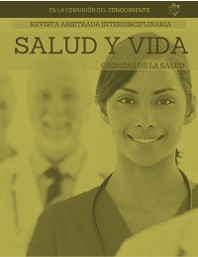Uso excesivo de alcohol gel como medida preventiva en COVID-19 en estudiantes universitarios
DOI:
https://doi.org/10.35381/s.v.v6i2.2151Palabras clave:
Epidemiología, enfermería, inducido químicamente. (Fuente, DeCS).Resumen
Objetivo: Determinar las consecuencias del uso excesivo de alcohol, alcohol gel como medida preventiva por covid-19 en el primer nivel de enfermería paralelo “A” de la universidad “Uniandes”. Método: Descriptivo observacional. Resultados: El 14,8% de la población afirma que se le irrita la piel cuando se coloca alcohol en las manos, el 3,7% afirma que casi siempre se le irrita la piel, el 29,6% afirma que a veces se le irrita la piel y el 51,9% afirma que nunca se le irrita la piel. Conclusión: Las consecuencias del uso excesivo de alcohol, alcohol gel desde que se decretó el estado de alarma provocada por la COVID-19 en la población en estudio comprobando que los principales síntomas son el enrojecimiento, descamación, sequedad, irritación, picazón, dolor y en algunos casos hasta grietas y erosiones que pueden ocasionar sangrado y la aparición de costras.
Descargas
Citas
Ferraguti G, Pascale E, Lucarelli M. Alcohol addiction: a molecular biology perspective. Curr Med Chem. 2015;22(6):670-84. doi: 10.2174/0929867321666141229103158. PMID: 25544474.
van de Wiel A. Diabetes mellitus and alcohol. Diabetes Metab Res Rev. 2004 Jul-Aug;20(4):263-7. doi: 10.1002/dmrr.492. PMID: 15250029.
Thakkar MM, Sharma R, Sahota P. Alcohol disrupts sleep homeostasis. Alcohol. 2015 Jun;49(4):299-310. doi: 10.1016/j.alcohol.2014.07.019. Epub 2014 Nov 11. PMID: 25499829; PMCID: PMC4427543.
Engen PA, Green SJ, Voigt RM, Forsyth CB, Keshavarzian A. The Gastrointestinal Microbiome: Alcohol Effects on the Composition of Intestinal Microbiota. Alcohol Res. 2015;37(2):223-36. PMID: 26695747; PMCID: PMC4590619.
de la Monte SM, Kril JJ. Human alcohol-related neuropathology. Acta Neuropathol. 2014 Jan;127(1):71-90. doi: 10.1007/s00401-013-1233-3. Epub 2013 Dec 27. PMID: 24370929; PMCID: PMC4532397.
Engler PA, Ramsey SE, Smith RJ. Alcohol use of diabetes patients: the need for assessment and intervention. Acta Diabetol. 2013 Apr;50(2):93-9. doi: 10.1007/s00592-010-0200-x. Epub 2010 Jun 8. PMID: 20532803; PMCID: PMC2954251.
Kudsiova L, Lansley A, Scutt G, Allen M, Bowler L, Williams S, Lippett S, Stafford S, Tarzi M, Cross M, Okorie M. Stability testing of the Pfizer-BioNTech BNT162b2 COVID-19 vaccine: a translational study in UK vaccination centres. BMJ Open Sci. 2021 Sep 12;5(1):e100203. doi: 10.1136/bmjos-2021-100203. PMID: 35047705; PMCID: PMC8647588.
Zhang M, Feng C, Zhang X, Hu S, Zhang Y, Min M, Liu B, Ying X, Liu Y. Susceptibility Factors of Stomach for SARS-CoV-2 and Treatment Implication of Mucosal Protective Agent in COVID-19. Front Med (Lausanne). 2021 Jan 14;7:597967. doi: 10.3389/fmed.2020.597967. PMID: 33521016; PMCID: PMC7840564.
Carissimo G, Ng LFP. A promiscuous interaction of SARS-CoV-2 with bacterial products. J Mol Cell Biol. 2020 Nov 18;12(12):914-915. doi: 10.1093/jmcb/mjaa068. PMID: 33326034; PMCID: PMC7798951.
Petruk G, Puthia M, Petrlova J, Samsudin F, Strömdahl AC, Cerps S, Uller L, Kjellström S, Bond PJ, Schmidtchen AA. SARS-CoV-2 spike protein binds to bacterial lipopolysaccharide and boosts proinflammatory activity. J Mol Cell Biol. 2020 Oct 12;12(12):916-932. doi: 10.1093/jmcb/mjaa067. PMID: 33295606; PMCID: PMC7799037.
Matsuno H, Yudoh K, Hashimoto M, Himeda Y, Miyoshi T, Yoshida K, Kano S. Antibiotic-containing hyaluronic acid gel as an antibacterial carrier: Usefulness of sponge and film-formed HA gel in deep infection. J Orthop Res. 2006 Mar;24(3):321-6. doi: 10.1002/jor.20070. PMID: 16479564.
Pérez-Köhler B, Benito-Martínez S, Rodríguez M, García-Moreno F, Pascual G, Bellón JM. Experimental study on the use of a chlorhexidine-loaded carboxymethylcellulose gel as antibacterial coating for hernia repair meshes. Hernia. 2019 Aug;23(4):789-800. doi: 10.1007/s10029-019-01917-9. Epub 2019 Feb 26. PMID: 30806886.
Bo Y, Zhang L, Wang Z, Shen J, Zhou Z, Yang Y, Wang Y, Qin J, He Y. Antibacterial Hydrogel with Self-Healing Property for Wound-Healing Applications. ACS Biomater Sci Eng. 2021 Nov 8;7(11):5135-5143. doi: 10.1021/acsbiomaterials.1c00719. Epub 2021 Oct 11. PMID: 34634909.
Soule LD, Pajares Chomorro N, Chuong K, Mellott N, Hammer N, Hankenson KD, Chatzistavrou X. Sol-Gel-Derived Bioactive and Antibacterial Multi-Component Thin Films by the Spin-Coating Technique. ACS Biomater Sci Eng. 2020 Oct 12;6(10):5549-5562. doi: 10.1021/acsbiomaterials.0c01140. Epub 2020 Sep 8. PMID: 33320549.
Rajapakse N, Dixit D. Human and novel coronavirus infections in children: a review. Paediatr Int Child Health. 2021 Feb;41(1):36-55. doi: 10.1080/20469047.2020.1781356. Epub 2020 Jun 25. PMID: 32584199.
Publicado
Cómo citar
Número
Sección
Licencia
CC BY-NC-SA : Esta licencia permite a los reutilizadores distribuir, remezclar, adaptar y construir sobre el material en cualquier medio o formato solo con fines no comerciales, y solo siempre y cuando se dé la atribución al creador. Si remezcla, adapta o construye sobre el material, debe licenciar el material modificado bajo términos idénticos.
OAI-PMH: https://fundacionkoinonia.com.ve/ojs/index.php/saludyvida/oai.









